
Reconnecting with Your Inner Child: A Deep Dive into Transformative Healing
The inner child is more than a metaphor—it’s a vital part of the healing journey. Explore how reconnecting with your inner child helps unravel emotional wounds, release survival patterns, and create lasting change from the inside out.
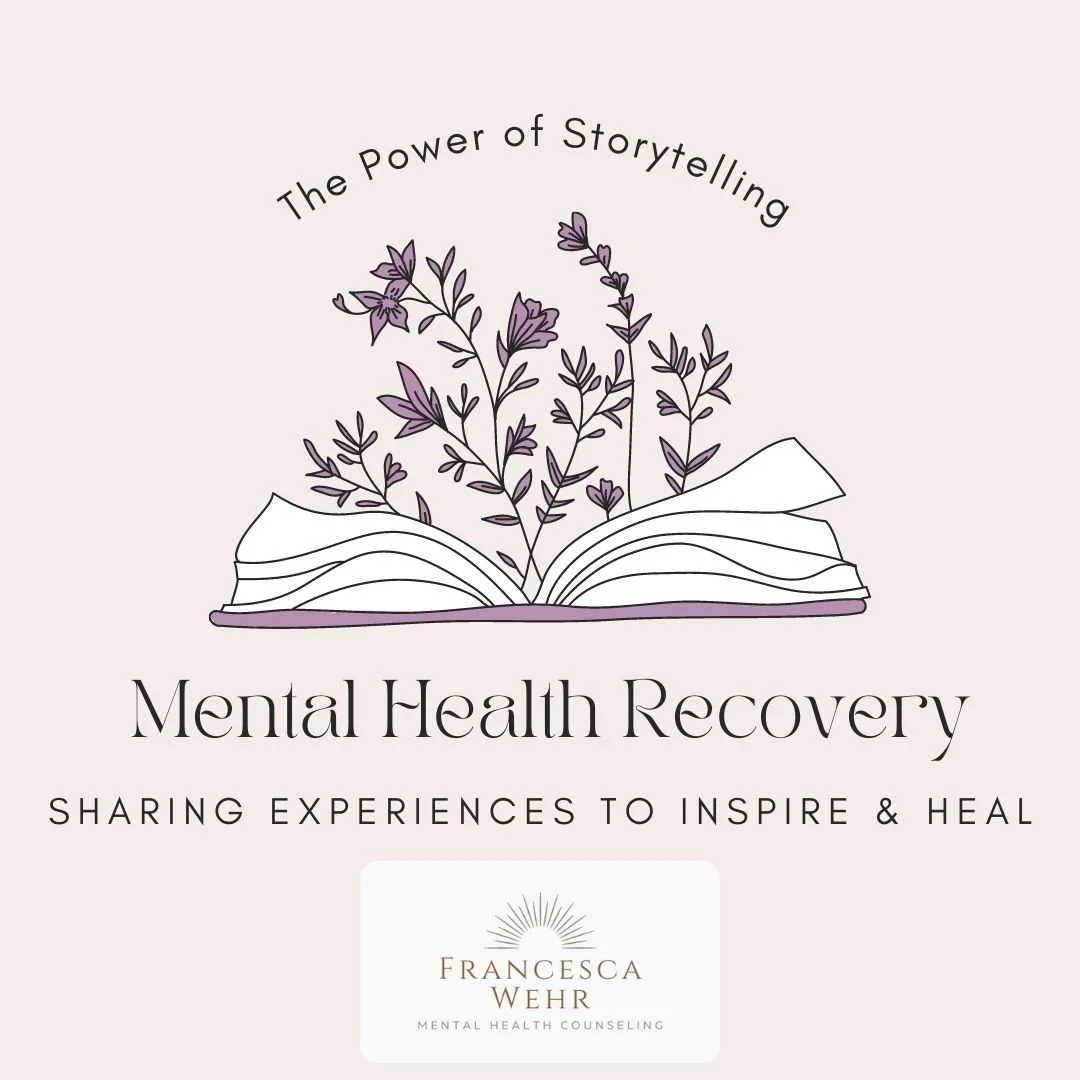
The Power of Storytelling in Mental Health Recovery: Sharing Experiences to Inspire and Heal
Storytelling has been an essential part of human culture for thousands of years, serving as a means of communication, education, and entertainment. In the context of mental health recovery, storytelling can also be a powerful tool for healing and inspiration. By sharing our experiences and listening to others, we can find strength, hope, and a sense of connection. Pathways to Wellness: Insights from Francesca Wehr, LCSW Mental Health Counseling discusses the importance of storytelling in mental health recovery and shares inspiring stories of individuals who have overcome emotional challenges through sharing their experiences.

Unlocking the Healing Power of Music Therapy for Mental Health
Music isn’t just background noise—it can be a powerful tool for healing. Learn how music therapy supports mental health, eases anxiety, lifts depression, and helps people reconnect with themselves. Explore the science behind it and simple ways to use music in your own self-care.

Understanding the Tapestry of Trauma Responses: A Deeper Dive
Trauma isn’t just about what happened—it’s about how your nervous system responded to a rupture in safety, trust, or connection. Many behaviors that seem confusing, frustrating, or even self-sabotaging are actually profound adaptations to distress. From emotional numbing to hypervigilance, people-pleasing to risk-taking, this article explores the nuanced spectrum of trauma responses and offers a compassionate reframing of these patterns. When we understand them as survival strategies—not flaws—we open the door to healing, self-trust, and deeper connection.

Understanding Grief: The "Ball in a Box" Analogy and Its Impact on Mental Health
Grief is an inevitable part of life, but understanding it can make the healing process more manageable. The "Ball in a Box" analogy provides a simple yet powerful explanation of how grief evolves over time. In this blog, we dive deep into the emotional and mental health impacts of grief, offering actionable coping strategies to help you navigate loss. Whether you're seeking personal healing or supporting a loved one through grief, this guide will provide the insights and tools you need to move forward with compassion and resilience.

The Hidden Impact of Unresolved Trauma on Relationships
Unresolved trauma often lingers beneath the surface, shaping how we connect with others in ways we may not realize. From trust issues to emotional triggers, its effects on relationships can be profound. Explore how trauma manifests in our interactions and learn actionable steps to heal and rebuild stronger, healthier connections.

“Daddy Issues" and Misplaced Responsibility
In our latest Pathways to Wellness blog post, Francesca Wehr, LCSW, delves into the complex dynamics of 'Daddy Issues' and misplaced responsibility. Discover how childhood experiences can shape adult relationships and learn effective strategies for healing and personal growth. Join us as we explore the impact of early parental relationships on mental health and provide actionable insights for a healthier, more fulfilling life.
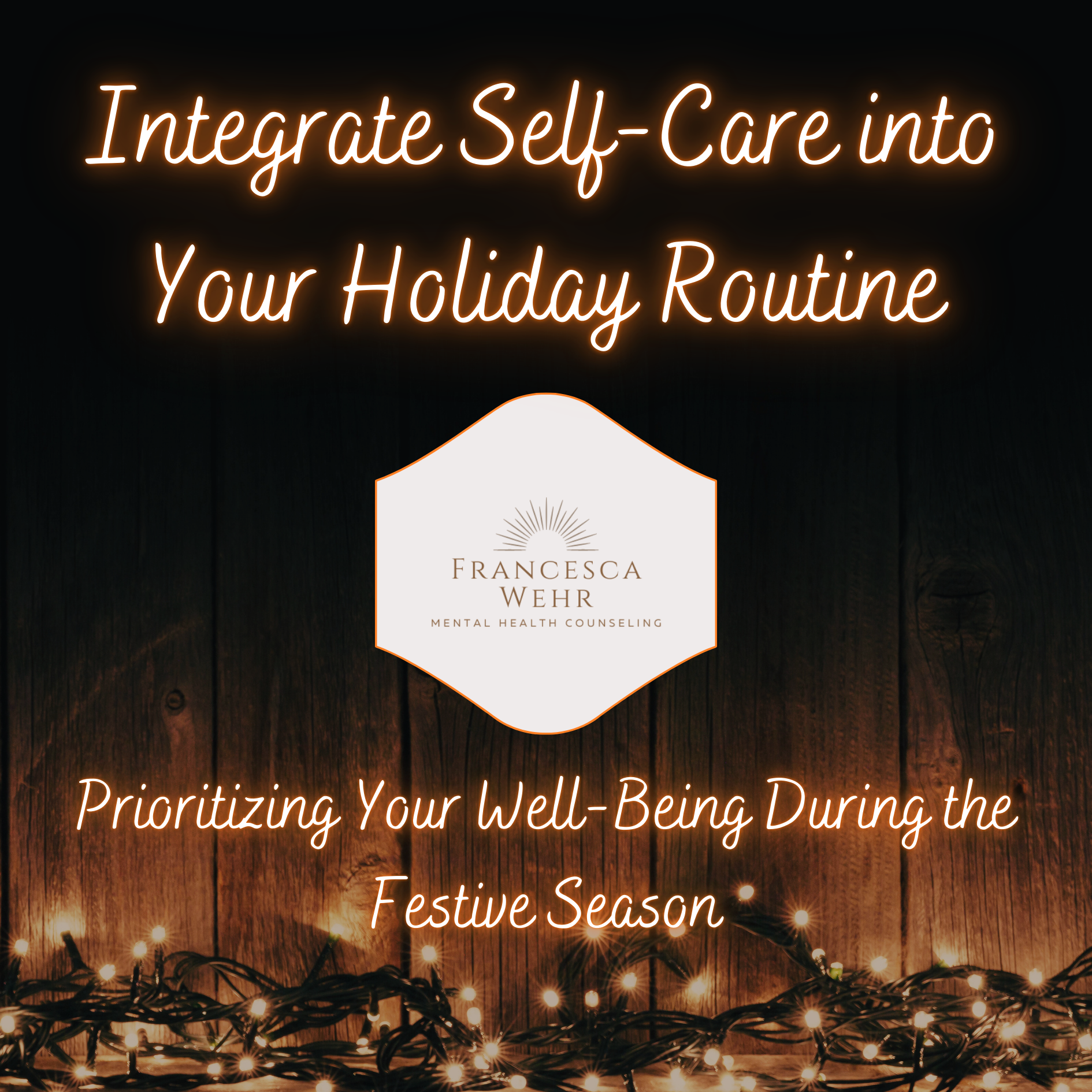
Integrate Self-Care into Your Holiday Routine: Prioritizing Your Well-Being During the Festive Season
Self-care often gets sidelined during the holidays, but it’s crucial for maintaining mental well-being. Discover simple yet effective self-care practices to keep you grounded and rejuvenated throughout the festive season.
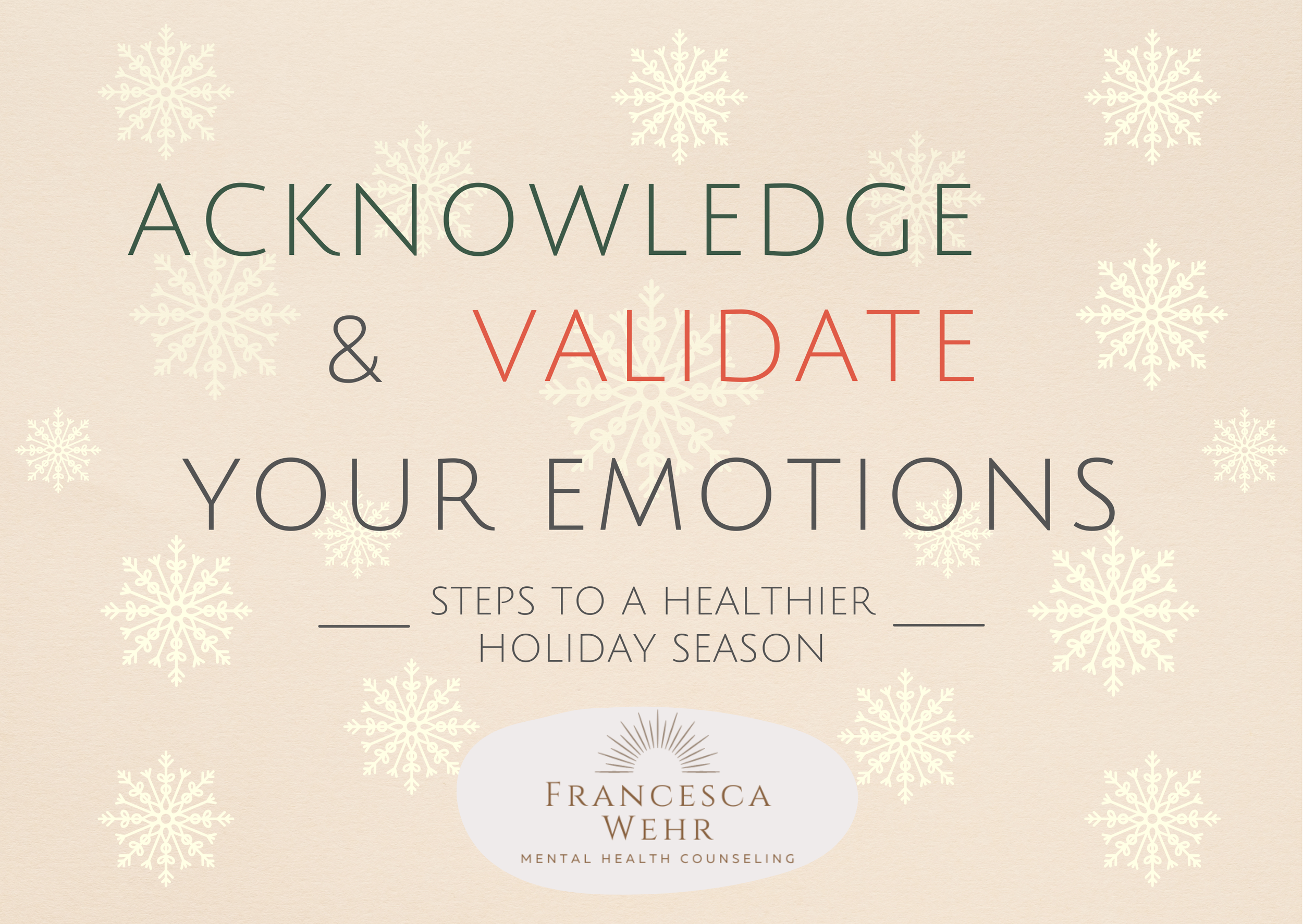
Acknowledge & Validate Your Emotions: Steps to a Healthier Holiday Season
The holidays can evoke a wide range of emotions. Instead of pushing them aside, learn how to acknowledge and validate your feelings. This post offers insights on embracing your emotional landscape with self-compassion.

Navigating Family Dynamics & Setting Boundaries During the Holidays: A Guide to a Peaceful Season
Family gatherings can be joyful yet challenging. Learn how to set compassionate boundaries and protect your mental well-being during holiday events. Discover practical strategies to manage family dynamics with grace and ease.

5 Signs Your Relationship Needs a Communication Tune-Up
Effective communication is the foundation of any healthy relationship, but even the best couples can experience breakdowns. If misunderstandings are frequent or tough conversations are being avoided, it might be time for a communication tune-up. In this post, we’ll cover five key signs that your relationship could benefit from better communication and offer actionable tips to help you reconnect with your partner.

Thriving in the Digital Age: Leveraging Technology for Mental Wellness
In the digital age, technology offers both challenges and opportunities for mental wellness. This article explores how to mindfully integrate technology into your life to enhance mental health. From setting boundaries with screen time to utilizing telehealth services and mental health apps, learn how to navigate digital stressors while leveraging online tools for emotional well-being. Discover actionable strategies to balance connectivity and self-care in an increasingly digital world.

Navigating Relationship Conflict: Managing Solvable, Perpetual, and Gridlocked Problems
Every relationship, no matter how strong, faces perpetual problems—recurring conflicts rooted in fundamental differences between partners. These issues, such as differences in personality, lifestyle, or values, can't always be solved, but they can be managed. In this post, we explore common examples of perpetual problems and offer strategies to handle them with empathy, humor, and acceptance, helping you build a stronger, healthier relationship despite the inevitable conflicts.

Unearthing the Roots: Understanding Phobias and Their Origins
Phobias are more than just intense fears—they’re often life-altering anxieties rooted in trauma, genetics, and learned behaviors. On the Pathways to Wellness blog, Francesca Wehr, LCSW, delves into the origins of phobias and explores therapies like EMDR and CBT to help you overcome these fears and regain control of your life.
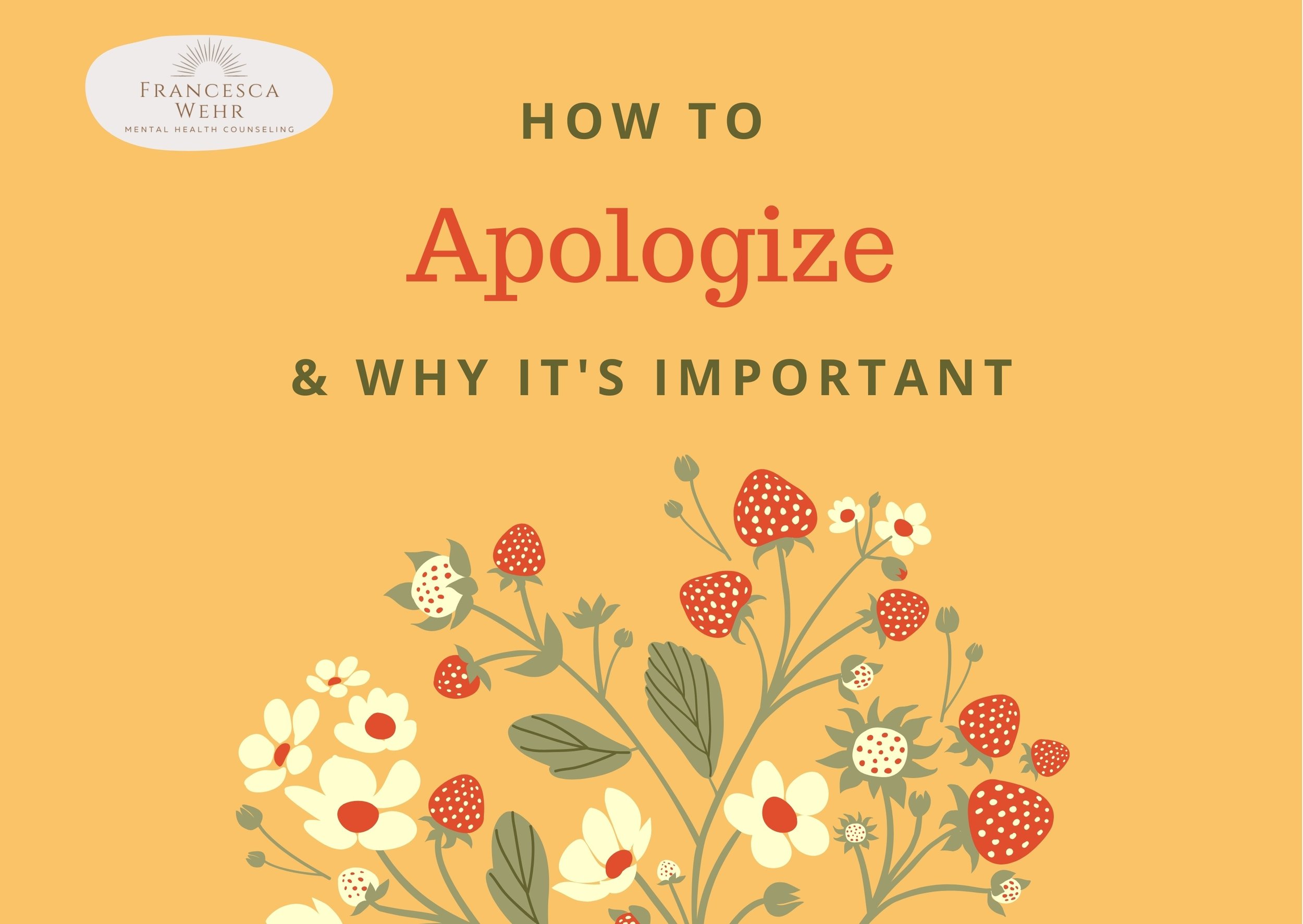
How to Apologize & Why It's Important
Mistakes are a natural part of life, but how we handle them can make all the difference in our relationships and personal growth. Francesca Wehr, LCSW, from Pathways to Wellness, explains the importance of a sincere apology and offers practical tips for making amends. Learn about the psychological impacts of apologizing and forgiving, and discover a guided self-reflection journal prompt to deepen your understanding of these essential skills. Embrace the power of an apology to heal, grow, and strengthen your connections with others.

Before You Speak, T.H.I.N.K.: The Power of Mindful Communication
The world of instant messaging and real-time conversations has undoubtedly made communication more accessible than ever. However, it has also made it all the more critical for us to pause and reflect on the words we use. The acronym T.H.I.N.K provides a simple yet potent framework for fostering mindful communication. It stands for Truth, Helpfulness, Inspiration, Necessity, and Kindness. This article delves into each component of the T.H.I.N.K method, illustrating how it can enhance interpersonal relationships and self-esteem.

Navigating the Storm: Understanding and Managing Rejection Sensitive Dysphoria
We've all felt the sting of rejection at various points in our lives. However, for some individuals, particularly those with Attention Deficit Hyperactivity Disorder (ADHD), this experience can be intensely emotional and debilitating due to a condition known as Rejection Sensitive Dysphoria (RSD). Pathways to Wellness: Insights from Francesca Wehr, LCSW Mental Health Counseling delves deeper into the understanding of RSD, its symptoms, examples, and possible coping strategies.

Navigating Your Inner Landscape: Understanding and Enhancing Self-Esteem
In the latest edition of "Pathways to Wellness," Francesca Wehr, LCSW, offers a profound look into the dual pillars of self-esteem and self-worth, revealing how these crucial elements of psychological health shape our perceptions and interactions. This insightful exploration highlights the fluid nature of self-esteem, influenced by our successes and the way we perceive others' views of us, and contrasts it with the enduring nature of self-worth—a deep-seated belief in our intrinsic value. Whether you're looking to build resilience, enhance personal development, or foster a healthier, more balanced self-image, Francesca's expert guidance provides the tools and understanding needed to cultivate a stronger sense of self in an ever-changing world. Join us to uncover the techniques and strategies essential for nurturing your self-esteem and self-worth on your path to wellness.

Healing from Emotional Abuse and the Maze of Reenactment
Join Francesca Wehr, LCSW, as she guides us through the complex journey of healing from emotional abuse. This insightful post delves into the phenomena of trauma reenactment and revictimization, shedding light on the subconscious patterns that perpetuate past traumas into present scenarios. Learn about the psychological underpinnings of trauma, effective coping mechanisms, and therapeutic strategies that aim to break the cycle of abuse and empower individuals towards a resilient and renewed self.
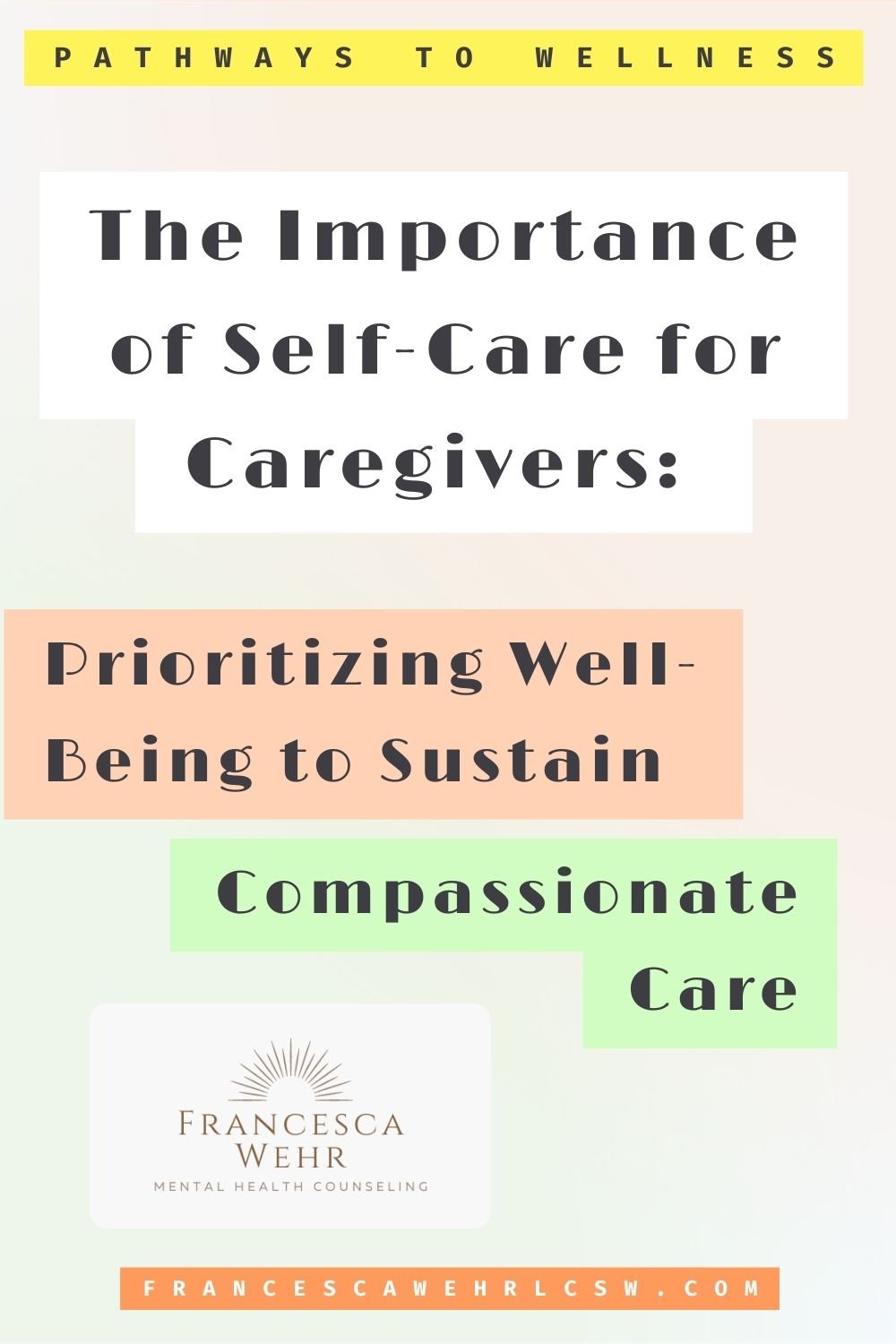
The Importance of Self-Care for Caregivers: Prioritizing Well-Being to Sustain Compassionate Care
Caregivers, whether professional or personal, play a vital role in supporting the well-being of others. However, the demanding nature of caregiving can take a toll on one's physical, emotional, and mental health. Self-care is essential for caregivers to maintain their own well-being and continue providing compassionate care for others. Pathways to Wellness: Insights from Francesca Wehr, LCSW Mental Health Counseling discusses the importance of self-care for caregivers and provides practical tips to incorporate self-care into daily routines.




